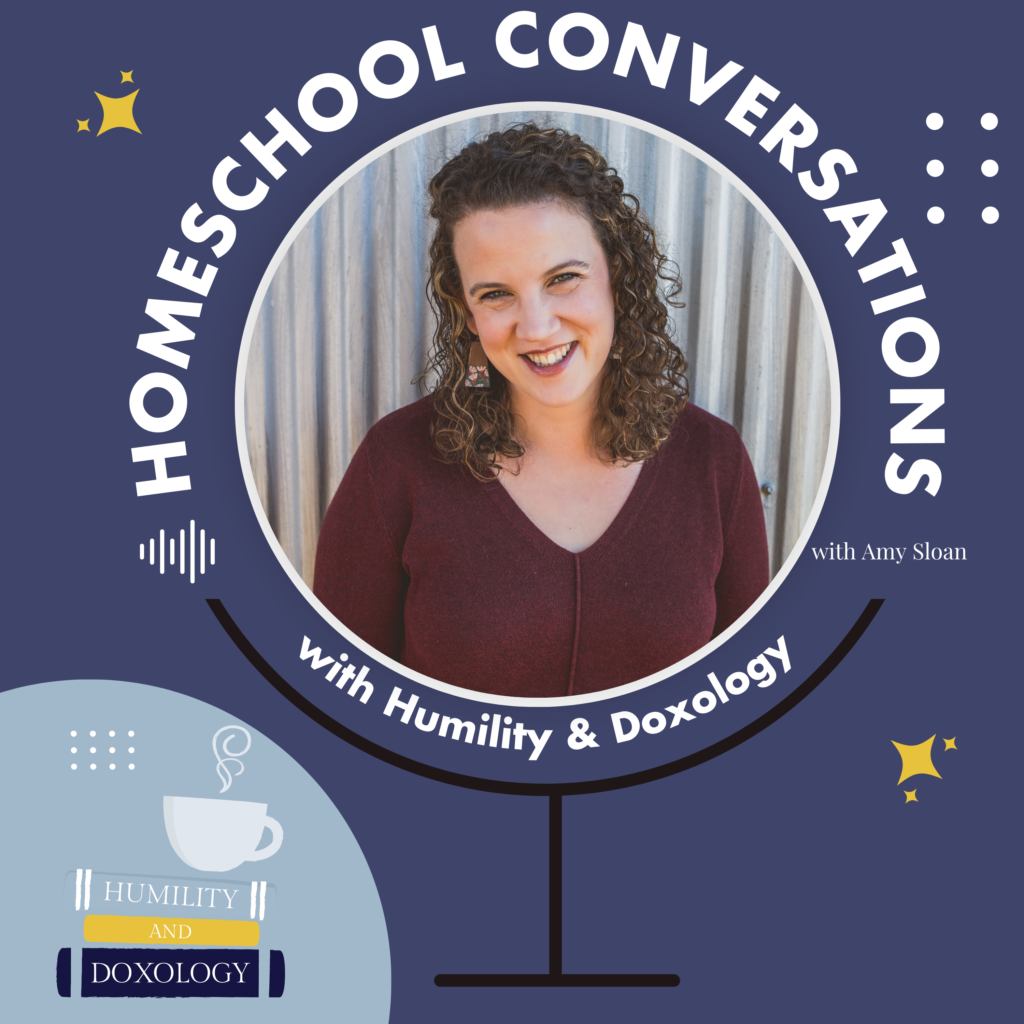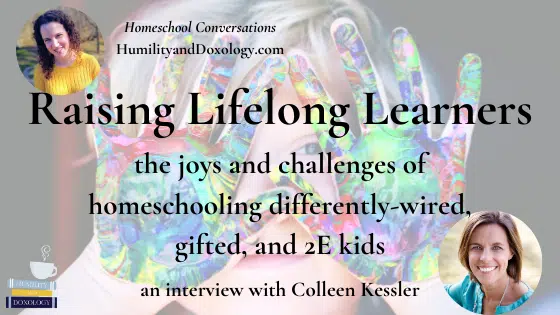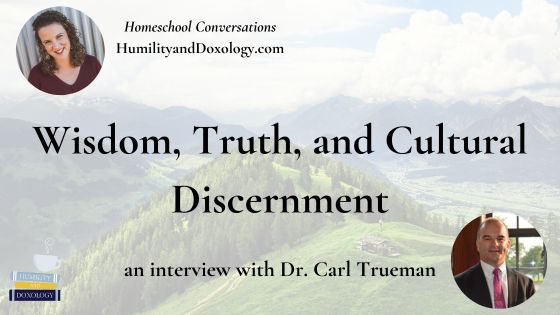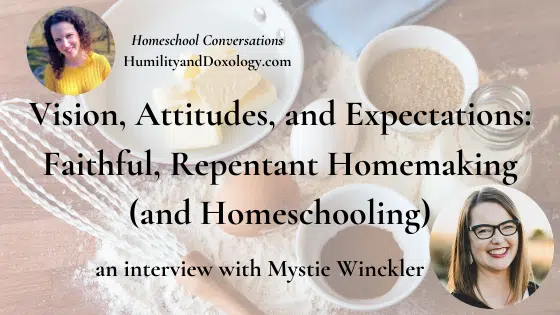Homeschool Conversations is BACK for Season 3, and I am so excited you’re here with us! To kick us off this season I’m chatting with my friend Colleen Kessler all about the joys (and challenges) of homeschooling quirky, differently-wired, gifted, and twice-exceptional kids. We both share some of our own personal stories in this episode and the lessons learned along the way. You’ll find practical tips and even strewing ideas and projects. I hope it is an encouragement to each of you!
Plus, I’m trying something new! This season I’m going to be including a full transcript for each episode in these show note posts, so even if you don’t have time to listen to the podcast or watch the videos you can still skim the transcript. Comment below and let me know what you think, ok? And no matter where you listen to the podcast content, please take a moment to leave a positive rating and review in your podcast player. It really means so much, and it helps other homeschool mamas discover this content.
Without further ado, on to my chat with Colleen!
Be sure to check out all the other interviews in our Homeschool Conversations series!
Watch the video. Listen to the podcast. Read the show notes. Share with your friends!
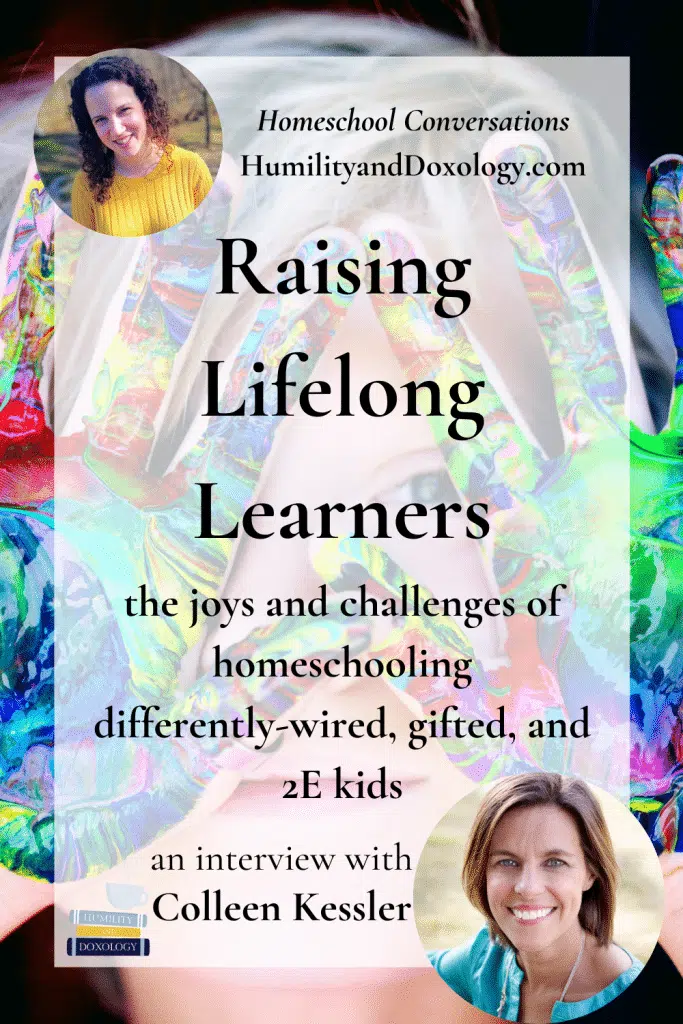
{This post contains paid links. Please see disclaimer.}
Who is Colleen Kessler?
Colleen Kessler believes that you are the absolute best teacher there is for your gifted, twice-exceptional, or otherwise differently-wired kiddo. She’s the author of more than a dozen books for parents, teachers, and children, award-winning educator, educational coach and consultant, and passionate advocate for the needs of differently-wired kids, Colleen has a B.S. in elementary education, a M.Ed. in gifted studies, and is the founder of the popular podcast and website Raising Lifelong Learners, as well as Raising Poppies, and community of support for parents of differently-wired kids.
Colleen lives in Northeast Ohio with her reading specialist husband, four delightfully differently-wired kiddos, pug puppy, and an ever-changing assortment of small animals and insects. You can find her online at RaisingLifelongLearners.com.
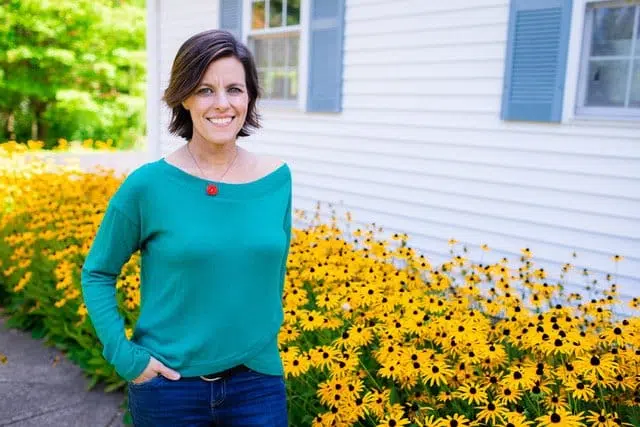
Watch my interview with Colleen Kessler
Special thanks to this month’s podcast sponsor Friendly Sciences! Read my full review of Friendly Sciences here.
Prefer to listen to your content? Subscribe to Homeschool Conversations on Apple podcasts or wherever you get your podcasts so you don’t miss a single episode!
Amy Sloan: Hello, friends. Today, I am joined by my friend, Colleen Kessler. Colleen, thank you so much for joining us today.
Colleen Kessler: Thank you for having me. This is going to be a fun conversation.
Amy: Yes! Colleen believes that you are the absolute best teacher there is for your gifted twice-exceptional or otherwise differently wired kiddo. She’s the author of more than a dozen books for parents, teachers, and children. She’s an award-winning educator, educational coaching consultant, and passionate advocate for the needs of differently wired kids. She’s also the founder of the popular podcast and website Raising Lifelong Learners and Raising Poppies, which is a community of support for parents of differently wired kids.
Colleen lives in northeast Ohio with her reading specialist husband, four delightfully differently wired kiddos, a pug puppy, and an ever-changing assortment of small animals and insects. [laughs] We are going to have lots of fun chatting today, but maybe not about the insects.
Colleen: We can let those go for now.
Getting Started Homeschooling
Amy: Colleen, I know in the introduction I talked a little bit about who you are and your family. Can you tell us just a little bit more about your family and how you came to start homeschooling?
Colleen: Yes, sure. I like to describe myself as an originally reluctant homeschooler that came into it kicking and screaming. It’s not what I set out to do. As Amy said in the beginning of the introduction, I’m an educational consultant. I was an educator for a decade and a half. I taught first to third grade and then I was a gifted specialist in an interestingly, I don’t know, zoned school district in northeast Ohio.
The zoning of it encompassed parts of three different cities and it was a very small district that was made up of mostly entrepreneurs, business owners, CEOs of companies, doctors, lawyers. There was a more heavily skewed population of gifted children and adults in this public school district, so we ran and operated more like a private school because we had to meet some pretty interesting needs. I taught for a decade and a half.
I left teaching originally, not to homeschool but to freelance write full-time. I was already writing books for teachers and kids and I thought it would be a really great way to use my education and my background and my writing ability while still being able to get those kids off the bus when they came home from school and have cookies waiting for them and just have the idyllic lifestyle of a freelancer working from home while her children are at school. But my first child didn’t really, I don’t know, agree with that plan of mine.
He is very differently wired. He is profoundly gifted. He also has some comorbid issues, like sensory processing challenges, ADHD-like behaviors, along with a little bit of anxiety that has eased over the years. Basically, in the classroom, he was a hot mess. He was the kid that was always falling out of his chair, challenging the teacher when he didn’t agree with something, needing to take too much time with stuff, zipping through and then disrupting other kids when something came easy for him, the one who had every crumpled paper that ever was supposed to be turned in shoved in the back of his desk along with chewed up gum and broken pencils and crayons and stuff.
He just didn’t fit in. We started him seeing a psychologist back then for the behavioral challenges as well as his anxiety, and there was a point where the psychologist turned and looked at me and said, “Well, you know he’s probably profoundly gifted.” In true shoemaker’s kids going shoeless sense, I missed that because I was so used to working with profoundly gifted and highly gifted children that he was just a normal kid to me. He was my first.
I was used to talking to young children at an adult level and having them solve problems in unique and outside the box ways. He was just the normal what I was used to. We ended up at her suggestion having him tested and he did test into the profoundly gifted range, which then led us down all sorts of paths in the field I had already had a master’s in but hadn’t dived into certain aspects of it. When you have a degree like you’re focused on certain areas and I hadn’t looked into things called over excitabilities and different challenges that go along with profound giftedness.
It was pretty quick that we realized that he wasn’t going to be a good fit for the public school system, especially where we lived as he was only in first grade and they didn’t start their gifted program until third, and they had let us know that even though he had the test scores that he probably wouldn’t qualify because his behavioral challenges were too much. Despite my background and my fieldwork and the conversations with them and the psychologist stating that he would likely have fewer behavioral problems if his intellect was challenged, they couldn’t make exceptions.
We looked into all sorts of different things including private schools, including a gifted magnet school that he was accepted to but in the end, we realized that the best place for him was going to be home at least temporarily until we figured things out. At the time, I also had a two-year-old daughter and a nursing baby. Driving him to a private or even a charter school that was 45 minutes each way was not going to be an option for us. We live in northeast Ohio and winters can be unpredictable and I just couldn’t imagine driving upwards of an hour a day each way with a screaming nursing baby in the backseat.
Really reluctantly and overwhelmed, we pulled him out in February of his first-grade year. He is now 17, actually, he’ll be 18 next month. He’ll be a graduating senior this year and he actually finished the coursework for his high school diploma about two and a half years ago and so he’s just been dabbling in lots of different things over the last couple of years and has started doing a college program this year. When he graduates at the end of this year as a high school senior, he will also graduate with his freshman year of college done and then three more years to go.
I also have three other kids who are on the gifted spectrum, somewhere though I haven’t had them formally tested because I haven’t needed to and the research bears out that siblings tend to fall plus or minus 10 IQ points of each other and based on where he is, it’s highly likely and probable that they are in the gifted range. Certainly, their behavioral and academic characteristics let us know that that’s true. One just turned 13. One just turned 11.
She struggles with a generalized anxiety disorder that has been identified, sensory processing disorder that has been identified, and then a couple of other things that were puzzling through including dyslexia and dysgraphia. Then I have a seven-year-old who might actually be in possession of a higher IQ than his big brother. We just let him, I don’t know, let him wrap us around his finger right now and see where things fall. [laughs]

Amy: I think it’s so fascinating to hear how you had all of this expertise and background professionally in your field, but then when you were faced with this actual human being in your own home, it was hard for even you to necessarily recognize the things that you were so good at working with other people’s children. It’s different when it’s your own children. It’s just a different kind of relationship dynamic. I think that that is maybe helpful for people to realize that the children that you’re closest to, in a sense, you know them better than anyone else does, but sometimes that very closeness can blind you to other things.
Colleen: Also, I think that one of the biggest challenges I know that I faced with that identification but also the other parents grapple with is we really want our kids’ lives to be easy. We want our kids’ lives to be successful. If there’s any kind of discrepancy or anything that, I don’t know, makes them seem like they wouldn’t fit in and be able to do what everybody else does, our natural instinct is to fix the problem. Often times, especially when we’re dealing with something like giftedness or even anxiety, we brush away what is the underlying cause of it to get to those symptoms because it’s easier to fix symptoms.
It’s easier to think about fixing symptoms. There’s a path to go down when really the realization has to come in that my kid is just not the kind that’s going to fit inside the box and so I need to figure out ways to help them have the best life they’re meant to have. I can’t fix anything, so we need to help them be who they are in the best sense. I joke often that Trevor could either save the world or destroy it. My job is to help him veer down that path where he’s more likely to save it than to destroy it, channel that energy and that chaotic crazy brain for good instead.
My first instinct was to fix the problems, fix the falling out of the chair, stop breaking pencils, stop talking back to adults instead of, this is the proper way we express our disagreement with somebody, you know what I mean?
Amy: Yes. In my own family, the children that are the most intense in their thoughts and feelings, the ones who so clearly have a passion for black and white and right and wrong, are very hyper-focused on whatever it is that they’re working on, whether it seems reasonable to the outside world or not. It’s taken me a long time to realize that that can be a gift. I think that part of the process of parenting is being able to take that as a gift but to know that it has to be directed.
We pray with them. Now that they’re old enough too, where you can discuss it with them, they recognize it themselves. They can see, “Okay, this can be used. Wow. Or it can really hamper me in my relationships with the rest of the world.”
Colleen: Oh, yes. [chuckles]
How has your approach to home education changed over the years?
Amy: You jumped into homeschooling slightly reluctantly, unexpectedly. Over the years, how has your approach to education changed or shifted?
Colleen: I did what so many parents do when they first start. I tried to find what is the perfect way to homeschool. As I’ve evolved, I’ve learned that there is no one right perfect way, the best way to homeschool is the way that you’ll actually homeschool. In the very beginning, I was looking for workbooks and things to replicate, at least, some of what he was used to.
I knew nothing about deschooling. Frankly, I didn’t know anything about anything because I had already started thinking that he wasn’t going to fit and I might need to do something. I started looking at maybe some blogs and websites and curriculum companies, but I was terrified to make that leap. When I finally realized that I had to, I didn’t know anybody. I didn’t know anybody in my area, which is so laughable now because we have to say no to things in order to actually stay home and homeschool.
In the beginning, I just was searching for anybody that did it so we could join. We joined library groups and field trip groups and all sorts of stuff just to get out. I also did very much by the book. I had taught for 15 years. I had a master’s degree in education. He was coming from a traditional classroom. We had a math book, and we had a handwriting book, and we had a journal and we had a reading program and all those things, and I felt that it had to be a certain number of hours every day and all of this stuff. My two-year-old at the time, she’s very, very bright.
She’s about 13 now, very creative, very artistic, but she is a box checker. She started writing when she wanted her own little table at two and then three, to do her homework and schoolwork alongside. Workbooks were working for her and not so much him. It didn’t take long, I guess, I’m trying to say to realize that the very reasons I pulled him were that kind of thing that wasn’t going to work in my home school. We do not thrive with set assignments and lecture-based type of things and textbooks.
My kids, for the most part, there is still a box checker in my house. For the most part, they thrive by diving down rabbit holes, searching for things that interest them. Going off on a tangent for a while and then pulling back from it and then picking back up wherever it was they left off. We have evolved from being very– I don’t know. When I first started, I was so drawn to Charlotte Mason and classical styles where there was short lessons of the– more nature-based of the Charlotte Mason ilk, but then the rigor of the classics. I tried to, of course, bring everything from everywhere and that was great. Over the years, we’ve learned that less is more, that nobody, and I had to remind myself of this for my own teaching.
My husband’s a teacher too, so he helps remind me of this. There is not a teacher in the world that finishes everything by the end of the year, there are always gaps. Kids move to different school districts. They have different teachers who have different passions and our job isn’t to as particularly as homeschoolers, but also as teachers is not to tell kids everything they need to know to live. My job as a parent-educator is not to teach them everything they need to know, my job is to teach them how to learn everything.
Wherever those gaps are, when they come up to a class that they want to take that might need prerequisites or they get excited about a potential career that they haven’t done enough legwork on, they know how to get the background that they would need in order to do that. Instead, we just really follow passive delight and interest. If I come across something that I find interesting, I’ll set it out, I’ll strew it on the table, so hopefully, someone will discover it.
We’ve been in a time, really for the last year and a half, we’ve had some challenging family things. Then on top of it, the last six months, everybody’s had challenging family things. We’ve gone to a more online approach in some degrees, but also that’s how the strewing has been. My kids have dive way back into nature study, which then sends them down a path to learn more about fungus or whatever, that they’re interested in fungi and mushrooms and spores and everything.
They dive down these rabbit holes, we’re using online field trips from a service called Streamable Learning. They’re doing more of that kind of stuff than they’ve ever done before because we don’t have as many places as we can go, our co-op isn’t meeting right now. We pick and choose based on what’s going on in our world, what’s going on in our home, and what the kids are interested in.
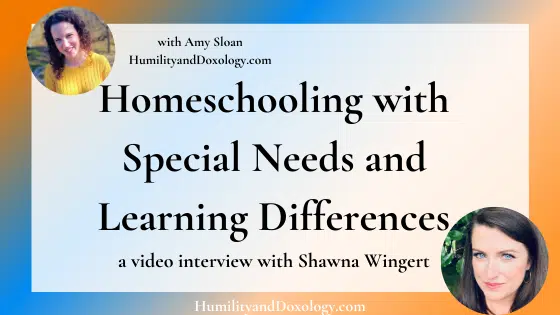
I think that my approach has really evolved into a more relaxed go-with-the-flow and trust that the process of homeschooling works no matter what philosophy you embrace, no matter what curriculum you use, and even if you don’t use any curriculum at all. I’ve met enough people over the years, thankfully, in my speaking and everything else that I’ve probably met someone who’s taken their kid along from every approach from heavy-duty classical with a cottage school approach to radical unschooling.
They all have success stories. Everything works as long as you’re fully invested in your kid. That has allowed me to really step back and notice where the connections need to happen first, and then build the curriculum from the connections and the interests.
Amy: I love that because so often, people get hung up thinking about gaps in the education or I’ve got to make sure I teach my child everything they need to know. Of course, that’s impossible. What’s way more important is that they have a desire to learn, not only that they know how to learn, but that they want to learn, that wonder and delight, which really form the core of my approach as a classical educator like a wonder and humility as you look out at the world around you.
You can’t necessarily replace that if you don’t have it, I mean, I guess you can by God’s grace.
Colleen: It’s a little harder though.
Amy: It’s a little harder to replace that later on than it is to realize, “Oh, there’s this certain math fact we never quite got to.” Or how to format the paper a certain way like, “Oh, yes, well, let’s just figure that out now, that will take like five minutes.” That love of learning is something that develops over the lifetime.
What do the terms Gifted or Twice-Exceptional mean?
We’ve talked and thrown around a lot of terms already, and maybe we should take a step back first, and just define terms, maybe for people who aren’t as familiar with terms.
Terms like gifted, twice-exceptional, which is sometimes abbreviated on the internet as 2E. Can you explain a little bit about what these terms mean and what they don’t mean?
Colleen: Yes, so I’ll give it to you in a clinical perspective first off, because that really is the identification. The term itself, “gifted,” means a kiddo who on an IQ score scores two standard deviations above average. I like to tell parents, if you’re looking at a bell curve, average is dead center. Then there’s these increments on either side, deviation, standard deviations from that average.
It’s whatever amount of points and we don’t need to go into that actual number. Two standard deviations above the average on the bell curve is where our gifted cut off is. Those are kids who clinically tend to understand material with fewer repetitions. Sometimes but not always, they have a bigger desire, greater desire to learn because it does come more easily. Just like anything else, any other kind of special need, you start at two standard deviations above the average. There are kids who fall in any range beyond those two standard deviations. Parents understand what that means. I compare it to the other side.
When we get two standard deviations below average, that’s when we have developmental delays. That’s when our developmental and intellectual delays start and disabilities and things like that. Gifted kids are equally discrepant from average, just on the other side of that bell curve. It really is a special needs kid, because their brain is wired, equally discrepant, from the bulk of all of our citizens. That’s not the right word, but you know what I mean. The average population, neurotypical people. The vast majority of low to high, to average people fall right dead center of that bell curve, and so our gifted kids are equally wired differently than the kids on the other end.
With that comes all sorts of other challenges and that’s where our twice exceptionalities come in. Just by themselves, gifted kids are discrepant. They like to say if you’ve met one gifted kid, you’ve met one gifted kid. Just like if you’ve met one developmentally delayed kid, you’ve met one because whatever it is they’re interested in, is going to be different. For a gifted kid who gets things more quickly, they can oftentimes, like you mentioned earlier, hyper-focus on something that really sparks them and dive so deeply.
They have a collegiate understanding of that one microcosm of topic and are behind in all the other areas because they’ve hyper-focused. Their brain has latched on to that. Whereas another gifted kid who’s right in the exact same IQ range will have focused on something completely different. Because their brains are wired differently, they tend to also be more susceptible to other things. Other comorbid, which are coexisting diagnoses like generalized anxiety disorder, or just anxious thoughts.
The difference between a disorder and just anxiety, in general, is that a disorder will interfere with every facet of your life. Gifted kids tend to be more anxious. A twice-exceptional gifted kid might have a diagnosed anxiety disorder, but might just be anxious, because they understand that really bad things happen and they happen to good people and intellectually, why isn’t that happening to me? Or it could happen to me tomorrow. They’re thinking of all of these thoughts that telling them the likelihood of it happening is not going to make it go away.
Whereas someone else, a neurotypical kid is going to be like, “Oh, okay. Yes, it’s probably not going to happen to me. I’m just going to go out there.” They are seeing all the worst-case scenarios. It also includes on common comorbidity as ADHD, sensory challenges like a hyper need for sensory input or a hyper need for a hyper version to those sensory input. Twice-exceptional just means gifted with another coexisting condition and that can actually be anything. There’s a huge myth that a gifted kid is just an easy kid, an easy person, because they can’t have anything else. They think and they get everything super quickly.
The truth is, just like a kid with developmental delays can be dyslexic or ADHD or have sensory processing or whatever so can a gifted kid. They don’t exclude anybody. Neurotypical kids can have dyslexia as well. It doesn’t differentiate between IQ. They can have it too. They tend to be harder to diagnose and treat because of their higher intellect. Their intellect can mask their disability and their disability can mask their intellect so they can come across like a kid who’s falling out of their seat and breaking pencils.
Like my oldest who on an IQ test scores in the profoundly gifted range, but in a classroom looks like the lowest common denominator because he’s always in trouble and not following along and not turning in his papers. Giftedness is two standard deviations above average on a bell curve. Then twice exceptional are kids who are gifted but also have a neurological, psychologic, emotional, or academic special need as well. Does that make sense?
Amy: Yes, very much so. It’s something that I’ve learned a lot more about in the past six years or so and I wish I had just known all of this information early on as a mom, because when you’re looking at a child who’s a preschooler who is in a nature class, and the teacher will ask a question, and they give a paragraph answer? The teacher is very confused until they realize that they read it off the poster in the front of the class and they have to tell that child, “I’m sorry. You can’t answer questions because you’re able to read the answers and we need to see what the other children have learned from this little nature class.”
Or they’re five and they’re self-soothing with complicated math facts. They just want you to go over math facts with them. As a young mom, you’re just like, “Oh, wow. They’re just really smart and that’s cute.” Not to realize that that was connected in some way. They weren’t also going to then be super mature, emotionally, and able to act their age while I was expecting an emotional maturity that corresponded with that mental ability and that was unfair. It’s one of those things I just want to tell young moms, learn from my mistakes!!
Colleen: Yes, it’s so hard. There’s two things I want to say to that really quickly. First of all, that for any parent out there listening and for you too, I have a bachelor’s degree now in elementary education. Do you know how much we learned about giftedness? One paragraph in one textbook in one class out of my entire undergrad. Even teachers don’t know that much about giftedness. You don’t learn about giftedness unless you go into gifted education because it still is a pervasive myth that they’re just going to be okay because they’re super smart.
There’s no reason a typical mom should know about it if teachers who are trained for four years in elementary education don’t know about it. First, anybody listening and thinking light bulbs are going off, there might be something else to look at for my kid, do not get discouraged and do not beat yourself up because I didn’t know about it until I went into the field because I had kids in my class like that. This was before I had my own kid.
Second, we have a term for that in gifted education in giftedness. That’s asynchrony. I think it’s the better definition of giftedness. I gave you the clinical definition of giftedness, right? Asynchrony is more of the practical definition of giftedness. Meaning, like I said before with the brain hyper-focusing on things that interest the brain and are novel to the brain. All the other stuff falls by the wayside.
You could have a really great intellectual conversation with a kid and then the next second you’re looking down at the playground and the 12-year-old that you just talked to like a 25-year-old is throwing mulch at the three-year-old and other parents are freaking out because no 12-year-olds should be throwing mulch at a three-year-old. That is actually socially, emotionally where he is. You need to treat that social-emotional lesson not like he’s a 12-year-old, but like he’s a three-year-old because in that moment, in that situation, that’s where his brain is.
I’ve got one with a whole bunch of alphabet letters after her description. She is super creative, she will spin stories like nobody’s business and will come up with all sorts of creative solutions to problems, yet she’s several grade levels behind in math. She has dyslexia which isn’t undiagnosed, but we– My husband’s a reading specialist, so we’re pretty sure. Just started reading at 11 this year, a chapter book sparked her and she’s taken off, but can hear problems and solve them in super ridiculously outside the box ways that you’re like, “That makes more sense. I’m going to go do what you said. Honey, we need to put this on the list, because that will organize your basement way better than the things you and I have been coming up with.”
Asynchrony is the trademark characteristic of a gifted kid. They are many ages at once, socially, emotionally, behaviorally, academically, conversationally, and that’s the hardest thing to parent and the hardest thing to teach about these kids because they don’t follow any linear anything. When you pick up a parent book, what to expect in the first five years or whatever it is, your kid is not checking those boxes and you’re getting discouraged and thinking you’re messing up, and you’re not. You just have a differently wired kid.
Amy: Then over time, I see so much growth and development when they’re older. I would also just say, don’t look at your five-year-old in despair thinking. “they’ll never turn out okay.” Just give it time. They just need more time for all the different parts of their body and mind to connect to the same page.
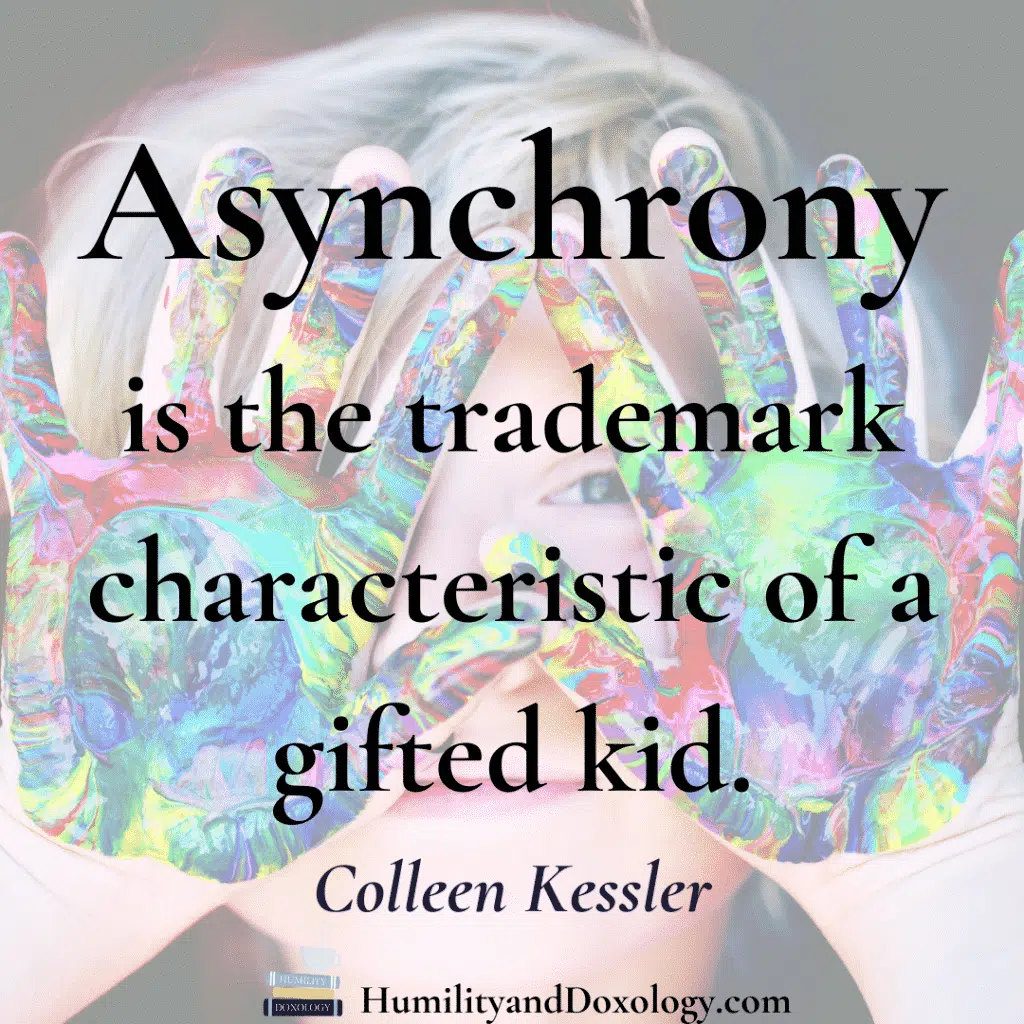
Best Parts of Homeschooling a 2E or Gifted Kid
We’ve talked a little bit about some of those challenges, but what are some of the best parts about homeschooling a twice-exceptional kid or a gifted kid?
Colleen: It’s so funny that you asked this because I just had a conversation right before I came on here with you today with a friend. She started as a reader. Gosh, I think she was probably my first blog reader. When I started, she found me through a Yahoo group that we were both a part of as like unexpected homeschoolers of gifted kids. Over the years, we’ve just connected because she lives a few hours away in Ohio, and we’ve connected over the years.
I was just having this conversation on Voxer because my kids are very on today. All of their quirks are shining in the most hilarious of ways today. I took a video of my 11-year-old doing a math problem and sent it to her. It took us over four and a half minutes per math problem today, because of her commentary and her storytelling about what she was doing, and her distraction over every little thing in the room. I have had enough caffeine and enough sleep to deal with it in an appropriate way. I just recorded it and sent it to my friend saying, “This is why I never get anything done in a timely fashion.”
Then my 13-year-old is full of all sorts of circumstances today and it’s hilarious. She is the funniest, sarcastic person ever. I cannot wait till she’s a full adult and I can join in the sarcasm because I have to bite my tongue and remember, she’s 13 really often. Then my teen he’s– When you said that about despairing, at your five-year-old, I just bared like all the time with him. I didn’t think that we would make it for between the years of 12 and 14 because they were hard. They were really hard. He was not looking like he wasn’t going to destroy the world.
Now he’s the 17, almost 18-year-old who comes in and plops himself down in my office after everyone’s asleep. We have these really great deep conversations. He’s super funny today. I think the best thing about homeschooling gifted and twice-exceptional kids is you get to be there front and center for all of that while there are tons and tons of challenges. There are days I lament over the fact that I would be doing them a disservice to put them on that yellow school bus but I really want to.
There are more and more as they get older and find themselves in all the confusion because remember, their minds are confused. They are all over the place and it’s just as hard for them to live an asynchronous life as it is for you to parent an asynchronous life because they’re making mistakes that an intellectual level they know they shouldn’t be, but they can’t stop their impulsiveness. They can’t stop their stuff.
They’re hearing you correct them again and again and again and getting discouraged. It’s just as frustrating, if not more for them. When they start to find themselves and be those really funny people that help you see what they’ll be like, as adults, it’s really exciting. I can’t wait to– I don’t wish away the moments I’m in though I do sometimes, truthfully, let’s just be honest. I am really excited for Thanksgiving dinners when they all come back because it’s going to be fun and funny.
Seeing some of that emerge now when you least expect it, it can make the day drag on and it can make the day fly by where you’re like, “I didn’t do any of the things I’m supposed to do today,” but it’s really fun. I just said to that same friend like, “These are the times I realize how much I love gifted kids and I’m so grateful I went into this field in the first place and then was blessed with my own because I don’t think that I could stand being bored and I’m never ever, ever bored.” That’s a good thing for my own quirky mind to have that novelty every moment of the day.
Amy: I love that. I love just the focus, too. Really what you’re talking about is the focus on the relationship. You have this special relationship with your children that is, Lord willing, going to transcend time, and I think about that too. I tell my kids, “Oh, I can’t wait till you’re back at the holidays! We’ll just quote our favorite Shakespeare plays to each other!” All these random family moments that we’ve gotten to have together. The good and the hard times, it’s all part of that.
How can we encourage a lifelong love of learning in our children?
Whether we have, a gifted child or a neurotypical child, we want to raise all of our children to be lifelong learners. What are some ways we can encourage that lifelong love of learning in our children?
Colleen: The very best way, if you only do one thing, it’s this: let them see you learn. They’re not going to do things they’re not seeing you do, because they’re modeling their adulthood. Their perception of what adulthood is like is what they’re seeing in you. They need to see you read. They need to see you take classes. They need to see you try new things, and better yourself or at least question, and they need to hear you say, “I don’t know that. Let’s go figure that out. I want to know that too.” Learning alongside them is a good thing, too.
That second part is dive down those rabbit holes with them. Let their curiosity lead, but then let them know how exciting it is for you to learn this too because you never got a chance to discover it or your own education was severely lacking in this area. It’s really interesting to you to find it out. A really good example of this happened recently. My oldest, they’re working in a program that is allowing them, to clap out of most of their first three years of a bachelor’s degree and they’re both doing the same first-class in it and it’s history.
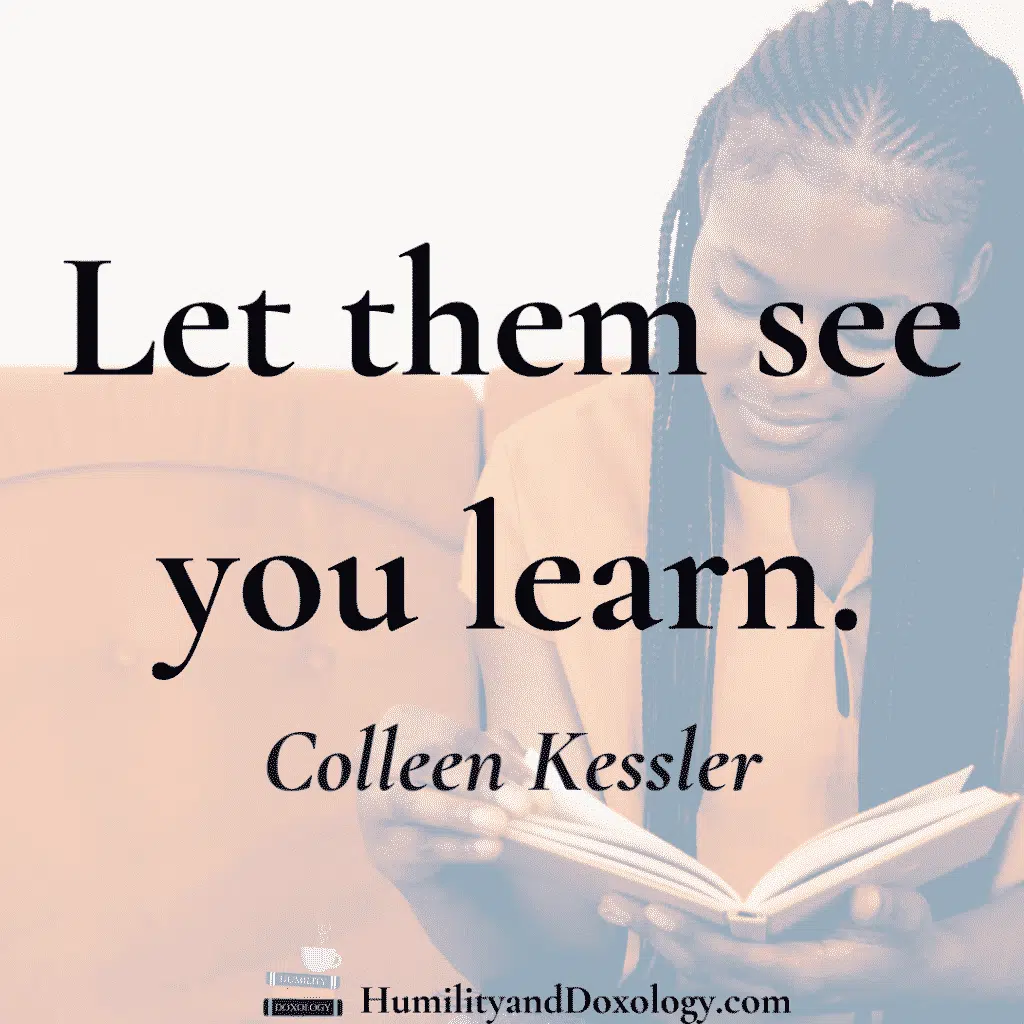
I didn’t have great history teachers. Let’s just put it that way. I had one really great one in 10th grade, it was world history and it was lovely. I still keep in touch with him. Other than that, I didn’t retain a lot of history, because it just wasn’t interesting to me with the way that it was taught. My daughter was reading the clap practice book and she asked me what the Molasses Act was. I had no memory of ever hearing about the molasses act.
I told her that. I’m like, “I have no idea. Let’s look it up because something else was referencing the result of the ramifications of this molasses act.” We dove down some really interesting rabbit trails of early American history and pre-revolutionary war stuff based on this question, what exactly was the molasses act and some really interesting philosophical conversations evolved because of it. Of course, there were some like throwbacks to Hamilton because my kids are obsessed right now.
I think the Molasses Act made it into a song that one of them was spoofing. It was really interesting and show them that I’m not afraid to admit, I don’t know something, and I’m not afraid to learn it with my 13-year-old. I think that’s a super powerful gift you can give your kids, letting them see you learn whether it’s for your own sake or for something that they’re doing just being a part of it.
Amy: I love that. Our family knows, or my kids know, “We have something we’re curious about, what’s mom going to do? She’s going to put a bunch of books on hold at the library.” We always have our stacks of things that we’re learning together, and being curious together. I think is one of my favorite parts about homeschooling.
Colleen: Me too.
What are you reading lately?
Amy: Before we close, I want to ask you two questions I’m asking all my guests this season. The first question is, what are you reading lately?
Colleen: I have been in a huge nonfiction research phase because I just finished the manuscript for a book that’s being released. Actually, by the time this airs, I think it will have been out like three or four weeks. I have been reading tons and tons and tons of books about emotional intelligence and resiliency, and really fascinating gender differences and how they learn and because the book is focused on emotional intelligence and resiliency, specifically in boys.
I’ve been skimming a lot of books for research. Because when I was really working deeply on the book, we were in the heart of COVID and all libraries were closed, no places like that had figured out at the time how to do curbside delivery or pickup or anything like that. You could not checkbooks out. I ended up having to buy, like, so sad, almost $300 worth of books because I needed the different perspectives for the research of my own.

One of the most fascinating books that I had skimmed through at the time and I’m now going back to read is, Why Gender Matters by Leonard Sax. It is fascinating. It goes into everything from the difference between how boys and girls hear and why, why boys tend to struggle in early elementary years because in a typical classroom, one of the reasons is because they don’t hear female speech patterns, as well as they hear male speech patterns, because the variance in wavelengths, the way that it hits their ears and is processed by their brains is different than how girls process those same wavelengths.

There really are biological and physiological reasons that little boys struggle in classrooms and it’s fascinating, and so many, talk about rabbit holes, I’ve gone down a whole bunch of other rabbit holes because of that book. I’m also reading, Michael Hyatt’s, Your Best Year Ever, so a business book, and I’m reading a– well, I haven’t started, it’s on my list of I have to start it because I have to give it back to my daughter’s friend, whom I borrowed it from, just a young adult book called The Selection or Selection.

It’s a romance series that both the girls are in love with, and so I said, I’d read it so I could talk with them better when we meet up for playdates. Selection, Why Gender Matters, highly recommended if anybody’s interested in that geek stuff and then Your Best Year Ever by Michael Hyatt.
Amy: All those all sounds really fun. I will definitely put links to those and I’ll link up also to your book that, in this time warp of pre-recording the podcast episode hasn’t come out yet, but we’ll link up to your book. What is this new book that’s coming out? What is the title?
Colleen: The book is called Raising Resilient Sons, A Boy Mom’s Guide to Building Strong, Confident, and Emotionally Intelligent Families.
Amy: All right, that’s exciting. Congratulations.
Colleen: Thank you. I’m super excited.

Tips for a Homeschool Day Going Wrong
Amy: The final question I have for you, and I thought in this second semester of homeschool year, it would be a good question to hear different perspectives on, because sometimes in those dark days of January, February, it’s hard to get through homeschool day. What tips would you share or what would you say to a mom maybe who the homeschool day just seems to be going all wrong?
Colleen: Yes. Don’t force it. Connection matters more than anything, and if you guys are all in tears over academics, nothing’s going to sink in anyway. Most parents, especially new homeschooling parents worry that if they just put it aside, they’re never going to get back to it, because their kids are going to play them and keep crying when math comes, and they might, they absolutely might.
That’s when you use the connections in the heart, relationships that you’ve built and sit down and say, “Hey, look, we’ve let math go for a little while because I know that it’s been causing problems between us, but I also know that you’ve been laying it out a little thick when math comes back around and it is something that needs to get done, so we need to come up with a solution together to solve this aversion you have to math or whatever it is.
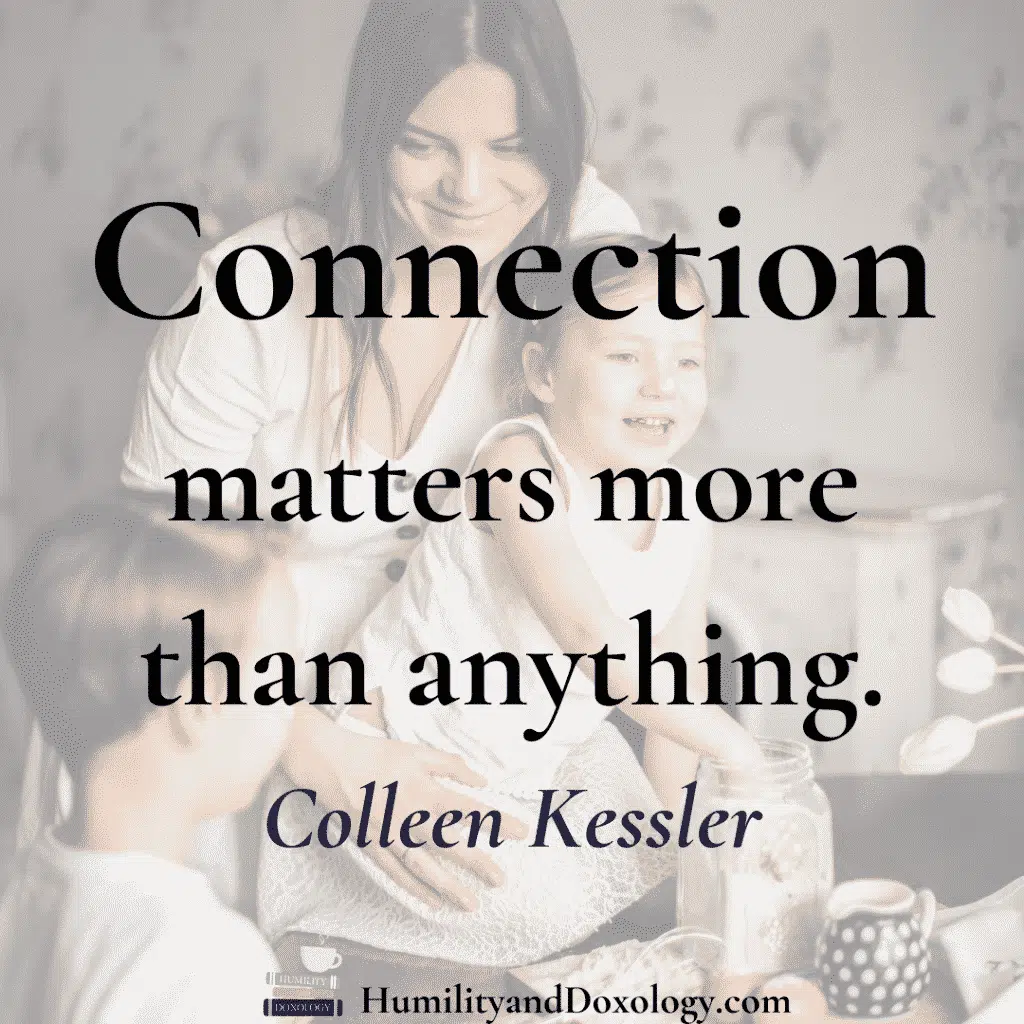
By building the connections and building the relationships in those crazy chaotic moments, you’re able to have those conversations, even with your littlest, for sure with your teams, but even with your littlest, you can say, “Hey, come on, you’re playing me here. Let’s get back to it, you can cry and throw a temper tantrum afterwards. We just have to get through these five problems,” but in those first moments and when you are all struggling, you really need to put it aside. You can go for a drive and put on an audiobook and still call that school.
You can go drive through ice cream, I have taken my kids to ice cream for lunch and really bad days, and there’s nothing like eating dessert for a meal that turns families around and makes people start laughing. Really, let it go. It is okay. You can always, always, always pick up the academics. Like I said, my 11-year-old is multiple years behind in math, she just is, it’s okay. It’s not a big deal. In fact, she was asking me what grade level she is today because we’re homeschoolers and she’s never known any different.
I said, “You’re technically a fifth grader. You’re all over the place in subjects.” She’s like, “Oh, I’m only in third-grade math.” I’m like, “No, you’re in level three math. There is a difference between level three math and third-grade math. You’re not in a classroom where there is a prescribed math curriculum. You are on the level you are supposed to be in based on how your brain is developing. There’s no shame in being in a 3A book in fifth grade because your brain is at level three in math, it’s okay.” She moved on after lots of storytelling and playing with the pug, but hearts over heads and connection over correction every single time.
Amy: I loved that. What a wonderful way to bring this interview to a close. Colleen, thank you. Can you tell people where they can find you all around the internet?
Colleen: Absolutely. Easiest place is Raising Lifelong Learners. You can find links to my podcast, blog posts, and social media, and everything else there. If you ever have any questions about anything, there’s a contact form there that has both an email. Oh, I’m losing my earbud. This is all, recorded video. You can send me an email through the contact form, but you can also send me a voicemail if it’s easier for you to talk.
I answer everything, sometimes not immediately and sometimes in the form of a blog post or a podcast episode, if I’ve gotten the question more than once, but your answer will be given. Contact me if you have any questions about giftedness or twice exceptionalities or differently wired brains.
Amy: Fantastic. I will link up to everything we’ve talked about today over in the show notes for this episode at HumilityandDoxology.com. Thanks, Colleen. Have a good evening.
Colleen: Thank you, you too.
Find Colleen Kessler Online
Raising Lifelong Learners
Check out all the other interviews in my Homeschool Conversations series!
